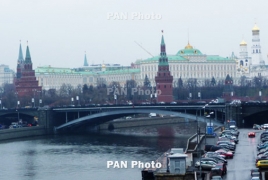Startfor: Russia can't lose no matter which party wins Armenia elections April 2, 2017 - 20:43 AMT PanARMENIAN.Net - Startfor global intelligence company website published an analytical feature on Russia’s influence on the political situation in Armenia. The feature reads: In a year of consequential elections, an impending parliamentary vote in Armenia could shake up the country's political order. When Armenians head to the polls April 2, the ruling Republican Party of Armenia (RPA), will find itself facing unusually stiff competition from the new alliances and political parties that emerged during the campaign. The elections, moreover, will mark the first vote since Armenia adopted a constitutional framework. This will see a transition from incumbent President Serzh Sarkisian — now entering his final year in office — to a prime minister chosen by parliamentary majority. But the country's voters and politicians will not be the only ones watching the results with interest. For Russia, Armenia's main economic and military partner, the elections offer an opportunity to advance its agenda in the country, not only through the ruling party, but also with the opposition. Compared with past races, the playing field for this election is more crowded, and competitive, than usual. Five parties and four political blocs are vying for parliamentary seats. Even so, the ruling party is polling ahead of its opponents, as it has in the past four elections. (The latest polls project that the RPA will get around 30 percent of the vote.) One of the reasons behind the party's enduring popularity, despite the current administration's middling approval ratings, is its new face, Karen Karapetyan, who was appointed prime minister last September as part of the RPA's pre-election rebrand. Karapetyan is arguably the most popular figure in Sarkisian's administration, which has weathered its share of political upheaval over the past year. Since taking office, the new prime minister has worked to improve his party's image with voters by ousting prominent members — among them former Prime Minister Hovik Abrahamyan — whose questionable business dealings had tarnished their reputations. The RPA Gets a Run for Its Money Opposition parties, meanwhile, have been busy making deals and forging alliances to shore up their prospects ahead of the elections. Traditional parties such as the Armenian Revolutionary Federation and the Free Democrats Party are each poised to win up to 5 percent of the vote. Combined with a few emerging parties, the opposition groups could give the RPA a run for its money. On Feb. 13, Seyran Ohanyan and two former foreign ministers announced that they had formed a new political alliance. Ohanyan, who left his post as Armenia's defense minister in October 2016 after eight years, is one of the most trusted figures in the country. Having turned down several job offers from Sarkisian, he is now trying to establish himself as a critic of and alternative to the current administration. So far, though, his bloc is only polling at about 2.5 percent. To boost its numbers, it considered joining forces with Gagik Tsarukyan, one of Armenia's wealthiest citizens and the founder of the Prosperous Armenia Party. Tsarukyan announced in mid-January that he would be returning to politics. Less than a month later, he was elected chairman of the Prosperous Armenia Party — the country's second-largest opposition party — and head of its political council. Prosperous Armenia, which has strong support among poor Armenians thanks in large part to Tsarukyan's philanthropic work, is currently polling at 28 percent, making it the RPA's most serious challenger in the parliamentary vote. A Win-Win for Moscow But no matter which party comes out on top, Russia can't lose. Karapetyan, Ohanyan and Tsarukyan alike all have close ties with Moscow, whether through business contacts or personal relationships with high-ranking Russian politicians. The prime minister, for example, has ties with several influential figures in Moscow and, as a former executive of the company's Armenian branch, a deep rapport with Gazprom. These relationships are an asset for Russia: The country has a vested interest in the upcoming election, since the party that emerges victorious will have the most say over Armenia's foreign policy. And because the RPA is leading the polls, Moscow isn't worried about keeping anti-Russian parties from taking over. Instead, it is focused on promoting alternative pro-Russian politicians who could eventually challenge Sarkisian or his successor (probably Karapetyan) if necessary. The Kremlin hopes that a future administration of its engineering could quell persistent concerns in Armenia about Russia's stance on the Nagorno-Karabakh dispute and its arms deals with Azerbaijan. In the meantime, however, Moscow will try to sow divisions in Sarkisian's administration to exert its influence on Yerevan. Signs indicate that Russia holds considerable sway with Armenia's foreign minister, Eduard Nalbanyan, through family contacts. But Nalbanyan's ties with Moscow don't sit well with the Defense Ministry, which has traditionally set Armenia's policy over Nagorno-Karabakh and is reluctant to let an ally of the Kremlin lead negotiations over the dispute there. Rumor has it that the Defense Ministry has even taken over some of the Foreign Ministry's traditional functions, such as meeting with foreign governments, as a result. Russia will continue with its strategy to influence Armenian politics long after the upcoming parliamentary vote has passed. After all, having learned from Sarkisian's government, which has resisted some aspects of the Kremlin's agenda on Nagorno-Karabakh, Moscow understands the importance of having allies on all sides of the political spectrum that can pressure Armenia's leaders when necessary. Related links: Six total incidents have burned 19 old-growth trees. Friday night 8 trees were torched along the beautiful main entrance. The EU does not intend to conduct military exercises with Armenia, Lead Spokesperson for EU Foreign Affairs and Security Policy Peter Stano says. Hikmet Hajiyev has said that there is no place for USAID operation in Azerbaijan any longer. A telephone conversation between Putin and Pashinyan before the CSTO summit is not planned, Peskov says. Partner news |